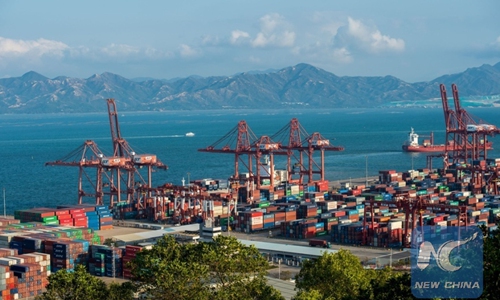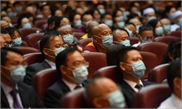China could set GDP growth target at 3% during Two Sessions
Fiscal deficit ratio to break through 3% in 2020 to shore up economy

File Photo: Xinhua
Most economists interviewed by the Global Times said that the target should be about 3 percent, which would give a much-needed boost to business confidence and serve as a guide for economic policy.
"China is a key component in restarting global growth. The world's second-largest economy needs GDP growth to sustain jobs and raise Chinese people's living standards," Wang Jun, chief economist at Zhongyuan Bank, told the Global Times on Wednesday.
Analysts said an appropriate GDP target would serve as a beacon to navigate through global economic volatilities.
"The target will also anchor China's monetary policy. If there's no reference point, there's a risk of inflation if authorities release too much capital to shore up the economy," Wang said. Setting a growth target also signals policy continuity.
China's central bank said that growth of total social financing and M2 should be basically in line with nominal GDP growth rates.
As the global pandemic may inflict second wave of losses on China's economy, this year's GDP growth target should not be set excessively high, meaning it chould fall between 3 percent and 3.5 percent, analysts said.
Tao Jin, an analyst at Suning Financial Research Institute, told the Global Times on Wednesday that 3-percent GDP growth should be the "bottom line" to create enough jobs for new college graduates.
The number of Chinese college graduates this year will reach a record high of 8.74 million, of whom 6 million will hunt for jobs, according to media reports.
Liu Chunyuan, a professor at Renmin University of China, estimated that each percentage point of GDP growth is expected to deliver 2 million new jobs.
One economist, who declined be identified, told the Global Times that China may set a two-year GDP target for 2020 and 2021, instead of one for 2020. "If so, the average annual growth rate (for the two years) will be set at about 6 percent."
Before the pandemic, analysts expected Chinese policymakers to set this year's target at roughly 6 percent. But in the first quarter, GDP fell 6.8 percent as businesses activity ground to a near-standstill while the coronavirus raged.
Analysts said the government will reduce its emphasis on a growth target this year. There have even been calls from prominent economists including central bank advisor Ma Jun to avoid setting a target this year.
"It's highly likely that China may not set a GDP target this year, as the world's second-largest economy will give priority to creating jobs, which are vital to people's living standards," Guan Tao, chief global economist of BOC International (China) Co and a former senior official at the State Administration of Foreign Exchange, told the Global Times on Wednesday.
Guan said that during the two sessions, China may set specific targets for per- capita disposable income and employment.
Tian Yun, vice director of the Beijing Economic Operation Association, told the Global Times on Wednesday that China is likely to lower its employment target this year amid the uncertainty arising from the pandemic, which has affected employment of many small manufacturers and export-oriented companies.
"If the unemployment rate is kept below 5.5 percent this year, China is doing a good job," Tian said.
Another heated topic - the annual fiscal deficit rate - will be raised to 3.5 or even 4 percent of the GDP to drive up investment and consumption, experts said. The Ministry of Finance set the fiscal deficit target at 2.8 percent of GDP for 2019.
A fiscal deficit of more than 3 percent is necessary for China to launch more bailouts amid the pandemic headwinds, Guan said. But that's still a low level compared with many developed economies.




